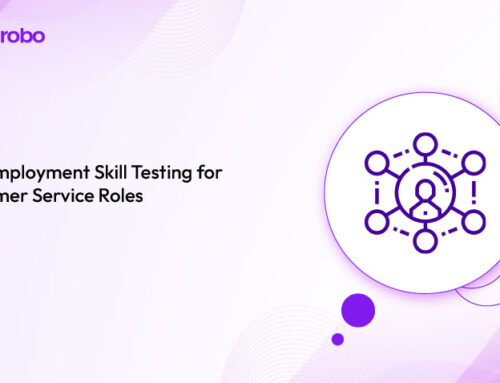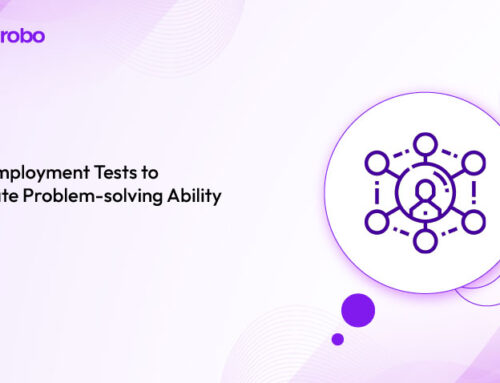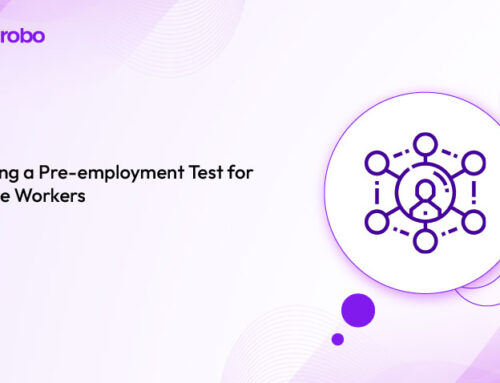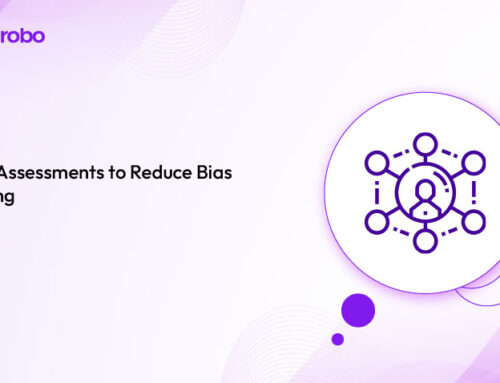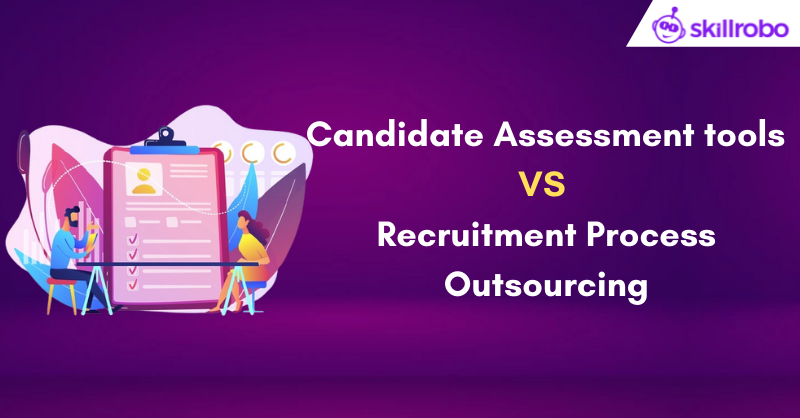
Key Takeaways
- Candidate assessment tools provide data-driven evaluations of a candidate’s skills, knowledge, and behavior before hiring.
- Recruitment process outsourcing (RPO) involves transferring all or part of the recruitment functions to an external provider.
- candidate assessment tools vs Recruitment Process Outsourcing – Choosing between candidate assessment tools and RPO depends on hiring volume, company resources, and strategic needs.
- Platforms like Skillrobo offer flexible and customizable recruitment assessment tools to improve hiring quality and speed.
Why Modern Companies Need Better Hiring Strategies
Finding top talent has never been more challenging. Traditional hiring methods, heavily reliant on resumes and interviews, often fail to uncover the real capabilities of candidates. Companies now seek smarter ways to filter applicants efficiently while maintaining high-quality hires. This has led to the rise of two major strategies: candidate assessment tools and recruitment process outsourcing (RPO).
Both approaches offer unique advantages, but knowing when and how to use them can dramatically affect hiring outcomes. With 75% of recruiters reporting increased competition for top talent adopting the right hiring strategy is no longer optional—it’s critical.
In this blog, we’ll explore candidate assessment tools vs Recruitment Process Outsourcing, their pros and cons, and how to choose the best approach for your hiring needs.
What Are Candidate Assessment Tools?
Candidate assessment tools are software solutions designed to evaluate applicants’ skills, knowledge, cognitive abilities, personality traits, and job fit before they are hired. They help recruiters make informed decisions by replacing assumptions with measurable insights.
Popular Types of Candidate Assessments Include:
- Skill Tests (e.g., Excel, coding, writing)
Skill tests evaluate candidates’ proficiency in specific job-related tasks. Whether it’s assessing Excel skills for finance roles, coding ability for developers, or writing quality for content roles, these tests measure practical, real-world abilities.
- Cognitive Ability Tests
These tests measure problem-solving, critical thinking, numerical reasoning, and logical analysis skills. Cognitive tests help predict a candidate’s learning ability, adaptability, and capacity to handle complex work situations.
- Personality and Behavioral Assessments
Designed to evaluate interpersonal skills, work style, and cultural fit, these assessments help understand how candidates may collaborate, lead, or respond to workplace challenges, reducing the chances of hiring mismatches.
- Situational Judgment Tests
These tests present candidates with hypothetical workplace scenarios and evaluate their responses. They help gauge decision-making skills, ethical reasoning, and the ability to navigate real-life job challenges effectively.
Platforms like Skillrobo offer a comprehensive range of recruitment assessment tools that streamline the hiring process by automatically screening, scoring, and ranking candidates based on real capabilities.
Benefits of Candidate Assessment Tools:
- Data-driven Hiring Decision
Candidate assessment tools generate measurable insights, allowing hiring teams to make decisions based on actual skills and behaviors rather than relying solely on gut feeling or resume claims.
- Reduced Bias and Guesswork
By standardizing the evaluation process, pre-employment assessment tests remove unconscious biases and subjectivity from hiring, ensuring every candidate is judged fairly and consistently.
- Faster Screening and Shortlisting
Automated scoring and ranking features drastically cut down the time recruiters spend manually reviewing resumes, enabling faster shortlisting of top-performing candidates.
- Enhanced Prediction of Job Performance
Candidates who perform well in role-specific assessments are more likely to succeed in the job, improving employee retention and reducing the cost of hiring mistakes.
- Improved Candidate Experience with Structured Assessments
Well-designed, job-relevant tests create a positive impression among candidates. A structured, transparent hiring process shows professionalism and enhances your employer’s brand.
What is Recruitment Process Outsourcing (RPO)?
Recruitment process outsourcing (RPO) is when a company transfers all or part of its recruitment activities to a third-party provider. These providers manage the entire recruitment lifecycle, from job posting and sourcing to screening, interviewing, and onboarding.
Typical RPO services include:
- Talent Sourcing and Headhunting
RPO providers specialize in actively sourcing top talent through multiple channels, including job boards, social media, referrals, and niche platforms, ensuring a steady flow of qualified candidates.
- Candidate Engagement and Nurturing
They manage ongoing communication with candidates, keeping them informed and interested throughout the recruitment process to reduce drop-offs and maintain a strong talent pipeline.
- Pre-screening and Background Checks
RPO teams conduct initial resume screenings, skills assessments, and background verifications, ensuring that only qualified and vetted candidates move forward.
- Interview Scheduling and Offer Management
They streamline administrative tasks like scheduling interviews, coordinating with hiring managers, and even managing offer letters and negotiations to ensure a seamless candidate experience.
Advantages of recruitment process outsourcing:
- Access to a Larger Talent Pool
RPO partners tap into extensive databases and networks, giving companies access to a broader, more diverse pool of candidates, including passive job seekers.
- Recruitment Expertise and Industry Knowledge
With deep knowledge of hiring best practices and industry-specific trends, RPO providers bring valuable insights that improve both the speed and quality of hires.
- Scalability Based on Hiring Demands
RPO models are flexible, allowing companies to scale hiring efforts up or down easily based on seasonal needs, business expansion, or changing project requirements.
- Lower Overall Cost Per Hire for High-volume Hiring
Outsourcing recruitment often proves cost-effective for large-scale hiring needs, reducing per-hire costs compared to managing everything in-house.
- Reduced Time-to-Hire and Administrative Burden
By taking over time-consuming tasks like sourcing, screening, and scheduling, RPO firms help companies hire faster and free up internal HR teams for strategic initiatives.
Candidate Assessment Tools vs Recruitment Process Outsourcing: The Key Differences
| Criteria | Candidate Assessment Tools | Recruitment Process Outsourcing (RPO) |
|---|---|---|
| Control | Full control remains with the in-house HR team | Recruitment is managed by an external vendor |
| Cost | One-time or subscription-based cost | Ongoing service fee or per-hire fee |
| Customization | Highly customizable assessments for each role | Some customization; standardized processes |
| Volume Suitability | Best for low to medium-volume hiring | Best for high-volume hiring |
| Speed | Faster screening and shortlisting | End-to-end hiring; can be slower |
| Data Ownership | Full ownership of candidate data | Shared or managed by RPO provider |
| Ideal For | Companies with internal HR capability | Companies needing full-scale hiring support |
Understanding the difference between candidate assessment and RPO is vital. While both can optimize hiring, their scope, costs, and control levels are vastly different.
When to Choose Candidate Assessment Tools
Candidate assessment platforms are ideal for organizations looking to maintain direct control over the hiring process while improving the quality of their hires. They work best when:
- You want full control over hiring decisions.
Skills assessment tools give hiring managers clear, data-backed insights without relinquishing control to third parties. You can tailor evaluation criteria, review results firsthand, and select candidates based on your company’s unique needs and values.
- You are hiring for specialized or critical roles.
For positions requiring specific technical skills or in-depth domain knowledge, assessments allow you to vet candidates rigorously before interviews, ensuring only top performers make it through.
- You want objective data to complement interviews.
Interviews can sometimes be subjective. By combining structured assessments with interviews, you add an evidence-based layer to the decision-making process, leading to more accurate, confident hiring choices.
- You are looking for a cost-effective solution.
Compared to outsourcing recruitment entirely, candidate assessment tools offer a more budget-friendly way to screen large volumes of applicants efficiently without sacrificing quality.
- You need to assess both hard and soft skills.
Modern platforms like Skillrobo allow you to evaluate not just technical abilities (e.g., SEO, accounting, coding) but also soft skills like critical thinking, communication, and collaboration—giving a holistic view of the candidate’s potential.
For example, using recruitment assessment tools like Skillrobo can ensure that digital marketing candidates are tested on SEO skills, analytics knowledge, and content strategy—all before the first interview.
Pros and Cons of Candidate Assessment Tools
Candidate assessment tools have transformed modern hiring by bringing structure, speed, and objectivity to the recruitment process. However, like any hiring solution, they come with their own set of strengths and limitations. Understanding both sides helps HR teams and hiring managers use these tools more strategically. In this section, we explore the key advantages that make assessment platforms essential—and the potential drawbacks you should be aware of before full adoption.
Pros –
- Objective screening eliminates bias.
- Faster shortlisting with automated scoring.
- Customizable tests for different job roles.
- Cost-effective compared to external recruiters.
- Better candidate engagement through interactive assessments.
Cons –
- Limited reach for passive candidates (needs proactive sourcing).
- Requires internal HR bandwidth to manage assessments.
- Assessment-only focus (doesn’t cover sourcing or onboarding).
When to Choose Recruitment Process Outsourcing (RPO)
Recruitment Process Outsourcing (RPO) is ideal for organizations looking to optimize large-scale hiring with minimal internal strain. It’s the preferred choice when:
- You have high-volume hiring needs.
When you’re recruiting for dozens or even hundreds of roles at once—such as during expansion, seasonal surges, or new project launches—RPO providers can efficiently manage bulk hiring without compromising quality.
- You want to scale recruitment quickly.
RPO firms offer the agility to ramp hiring up or down based on your business needs, ensuring you can meet aggressive timelines without overstressing internal teams.
- Your internal HR team is overburdened.
If your HR department is struggling to balance daily operations with intense hiring demands, outsourcing recruitment functions to experts can free up resources and improve overall productivity.
- You require global hiring support.
Expanding into new markets? RPO providers have established networks and compliance expertise in multiple regions, helping you recruit internationally without legal or logistical hassles.
- You want access to specialized recruiters in niche industries.
For sectors like healthcare, tech, or finance, RPO providers bring specialized knowledge and access to passive candidates, ensuring you tap into top-tier talent pools that are otherwise hard to reach.
Companies undergoing mergers, expansions, or mass recruitment campaigns often prefer the advantages of recruitment process outsourcing to quickly meet their talent demands.
Pros and Cons of Recruitment Process Outsourcing
Recruitment Process Outsourcing (RPO) offers companies a powerful way to manage hiring at scale, leveraging the expertise and resources of specialized recruiters. While RPO can deliver faster hires, better candidate quality, and cost savings, it isn’t a perfect fit for every organization or situation. In this section, we’ll break down the key advantages and challenges of using RPO so you can make a more informed hiring decision.
Pros –
- Scalable according to hiring needs.
- Industry expertise from specialized recruiters.
- Reduced HR workload internally.
Comprehensive services from sourcing to onboarding.
Cons –
- Higher cost for small companies.
- Less control over the hiring process.
- Potential cultural mismatch if the RPO provider isn’t aligned with your brand.
Real-World Example: Candidate Assessment Tools in Action
A mid-sized tech company in California was struggling to find qualified software engineers. Their interviews revealed impressive resumes but poor technical skills. After implementing Skillrobo’s technical assessment platform, they screened candidates on coding, problem-solving, and logical reasoning before interviews.
Results achieved:
- 40% reduction in interview time
- 30% improvement in technical hiring quality
- 25% decrease in employee turnover within the first year
The company realized that integrating recruitment assessment tools early in the process gave them better hiring outcomes compared to relying only on sourcing.
How Skillrobo Helps Bridge the Gap
businesses need tools that balance speed, accuracy, and fairness. Skillrobo bridges the gap between traditional recruitment challenges and modern hiring needs by offering a robust, AI-powered candidate assessment platform tailored for organizations of all sizes.
Here’s how Skillrobo makes a difference:
- 100+ Ready-Made Skills and Behavioral Tests
Skillrobo offers an extensive skill library of customizable pre-employment tests that cover technical skills, cognitive abilities, soft skills, and behavioral traits. Whether you’re hiring for marketing, finance, tech, or customer support roles, you’ll find assessments ready to use—or easily tailor them to your specific needs. - AI-Driven Anti-Cheating Mechanisms
Maintaining test integrity is crucial. Skillrobo uses smart anti-cheating features like randomization of questions, timer controls, and live proctoring to ensure that the assessment environment is fair and secure, reducing the risk of malpractice. - Role-Specific Assessments
Generic tests can’t predict real-world performance. Skillrobo allows recruiters to create assessments that mirror the exact demands of the job—ensuring candidates are evaluated on skills that truly matter for the role they’ll fill. - Real-Time Reporting and Candidate Benchmarking
Skillrobo’s real-time analytics deliver instant, actionable insights. Recruiters can view performance summaries, compare candidates objectively, identify top performers quickly, and make smarter, data-backed hiring decisions. - Easy Integration with ATS and HRMS Platforms
Skillrobo seamlessly integrates with popular Applicant Tracking Systems (ATS) and Human Resource Management Systems (HRMS), simplifying workflows and making it easier to manage candidate data across platforms without any manual duplication.
Whether your goal is to improve technical hiring, enhance team fit, reduce unconscious bias, or speed up the shortlisting process, Skillrobo offers a scalable, secure, and efficient solution—all from a single, user-friendly dashboard.
Final Words: Choose Smart, Hire Right
When it comes to candidate assessment tools vs recruitment process outsourcing, there’s no one-size-fits-all answer. Each approach has its strengths, depending on your company’s size, goals, and hiring complexity.
- Use candidate assessment tools if you need greater control, cost savings, and skills-focused evaluation.
- Choose RPO if you need full-scale, fast, and global hiring support.
By combining smart assessments with structured recruitment workflows, companies can build stronger, more capable teams—faster and more fairly. Ready to make better hiring decisions? Explore Skillrobo’s candidate assessment solutions today. Sign up and start your free trial now!



